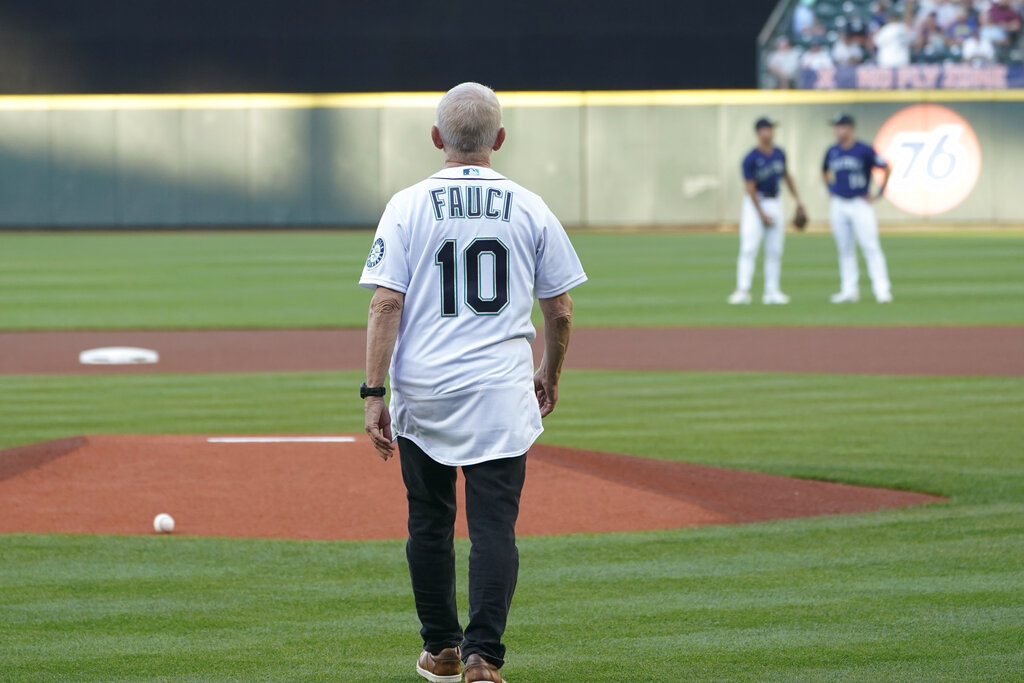In a packed auditorium at Seattle’s Fred Hutchinson Cancer Center, Dr. Anthony Fauci led a conversation Tuesday afternoon about the county’s deep divide around COVID-19, his involvement in early HIV/AIDS research and the role of public health in the future.
Fauci, chief medical adviser to the president and director of the National Institute of Allergy and Infectious Diseases, was in town to accept the 2022 honorary Hutch Award at Tuesday’s Mariners game.
The Hutch Award usually goes to a Major League Baseball player who embodies the spirit of Fred Hutchinson, a pitcher who died of cancer in 1964. It has only been given as an honorary award once before, to former President Jimmy Carter in 2016.
But before his ceremonial first pitch, Fauci spoke with the Hutch’s Dr. Larry Corey, a professor in the Vaccine and Infectious Disease division, on public health history and ongoing obstacles.
Early HIV/AIDS research
While Fauci has emerged as perhaps America’s most well-known source of COVID information, he was an immunologist when he first read about HIV in 1981, Corey noted. That report changed the course of Fauci’s career.
“I completely turned around the direction of my lab, which was really quite successful studying inflammatory disease in the role of immunosuppression,” Fauci said, settled into a brown leather armchair. “Everyone thought I was crazy.”
When he became director of the National Institute of Allergy and Infectious Diseases, Fauci wanted federal funding. But he faced reluctance from former President Ronald Reagan, who “never mentioned the word AIDS until his second term,” Fauci said.
As treatments were approved and health institutions built out distribution networks, the fight against the epidemic changed. Richer countries could more readily access expensive treatments, while poorer countries continued to face the worst of the disease.
In 2002, Fauci asked former President George W. Bush to up federal spending to about $15 billion over five years in order to treat millions of people.
“I wasn’t sure he was going to accept it,” he said. “Then finally, right before the State of the Union address [in 2003], his team called me down to the White House. He announced it without telling anyone.”
The funding launched the President’s Emergency Plan for AIDS Relief, which allowed the federal government to grant full or tentative approval for drugs more quickly to treat HIV and AIDS. The program is still in place.
Fauci said he’s reminded of some of the stigma around HIV as the monkeypox virus spreads globally, disproportionately infecting men who have sex with men.
In addition, he said, the challenge of responsibly implementing tools and drugs remains a burden on the country’s health system.
COVID response
While Fauci acknowledged the country continues to battle the COVID pandemic, he voiced deep disappointment and concern over Americans’ divided outlook on the disease.
“We’re in a very difficult situation,” he said. “A third of the people in our country are vaccinated and probably boosted. How can that possibly be when you have a disease that’s killed one million Americans and you have a hesitancy to use lifesaving interventions?
“What world are we living in?” he continued.
The response has changed the way he thinks about Americans’ willingness to accept science, he said.
“If we knew in the first few weeks what we know now, we would have done everything different,” Fauci said, suggesting masking and social-distancing policies should have been implemented even earlier. “But the country would not have accepted what we were saying.”
Fauci also expressed uncertainty about how to best address issues of long-term health inequity — including around COVID’s spread and treatment.
“The social determinants of health are rooted in institutional racism going back to slavery,” he said. “And that’s it. Our original sin of slavery just goes through the opportunities people have.”
“The Fauci Effect”
As the conversation neared an end, Corey brought up the “Fauci Effect,” a term coined in late 2020 as medical schools noticed a record number of applications. Admissions officials largely attributed the trend to examples of medical workers and public health figures as role models.
When asked, Fauci shied away from taking too much credit, saying the effect is less about him and more about what he symbolizes — which he sees as a stable source of information in the “era of the normalization of untruths.”
“Don’t accept normal flagrant distortions of truth and reality,” he said. “Once you do that, nothing counts. The truth doesn’t mean anything.”
His visit to the Hutch ended with a brief Q&A with a group of high school students in the center’s summer internship and learning programs. To them, he had a few pieces of advice: Keep on your path, and don’t let intimidation keep you from the field.



